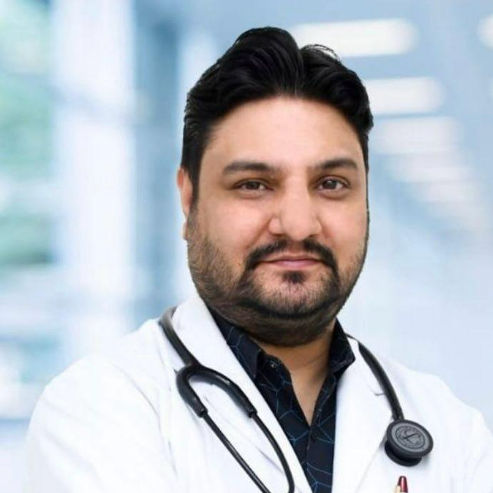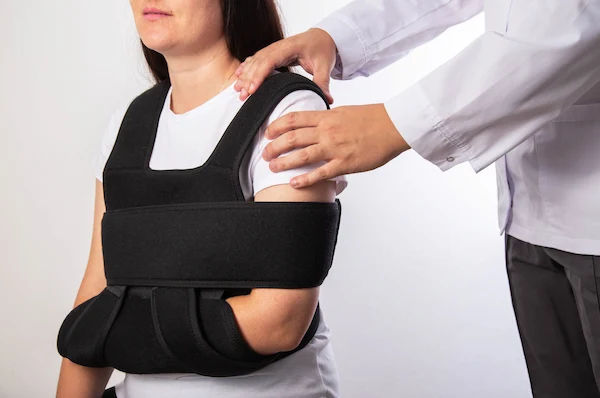Diarrhea: Overview of Symptoms and Treatment
Learn about diarrhea, its common symptoms, potential causes, and effective treatment options. Understand when to seek medical help and how to manage dehydration and discomfort.

Written by Dr. Dhankecha Mayank Dineshbhai
Reviewed by Dr. Shaik Abdul Kalam MD (Physician)
Last updated on 26th Aug, 2025
.webp?tr=q-80,f-webp,w-350,dpr-2,c-at_max 700w)
Diarrhea is a common digestive problem that most people experience at some point in their lives. While it’s usually not serious, it can be uncomfortable and sometimes lead to dehydration if not managed properly. In this article, we’ll discuss what diarrhea is, its symptoms, causes, and how to treat and prevent it effectively.
What is Diarrhea?
Diarrhea is a condition where you pass loose, watery stools three or more times a day. It happens when your digestive system doesn’t absorb enough water from the food you eat, or when your intestines produce extra fluid.
Consult a Top Gastroenterologist
Types of Diarrhea
Below are the different types of diarrhea,
- Acute Diarrhea – Lasts for a few days and is usually caused by infections (viral, bacterial, or parasitic).
- Chronic Diarrhea – Persists for more than four weeks and may indicate an underlying health condition like irritable bowel syndrome (IBS), celiac disease, or inflammatory bowel disease (IBD).
Common Symptoms of Diarrhea
Besides loose stools, diarrhea may come with:
- Frequent bathroom visits
- Abdominal cramps or pain
- Bloating and gas
- Nausea or vomiting
- Fever (in case of infections)
- Dehydration (dry mouth, dizziness, fatigue, dark urine)
If diarrhea lasts more than two days (or one day in children), or if you notice blood in stools, high fever, or severe dehydration, seek medical help immediately.
What Causes Diarrhea?
Diarrhea can be triggered by various factors, including:
1. Infections
- Viruses (Norovirus, Rotavirus)
- Bacteria (E. coli, Salmonella, Shigella)
- Parasites (Giardia)
2. Food Intolerances & Allergies
- Lactose intolerance (difficulty digesting dairy)
- Gluten sensitivity (celiac disease)
3. Medications
- Antibiotics (they can disrupt gut bacteria)
- Antacids with magnesium
4. Digestive Disorders
- Irritable Bowel Syndrome (IBS)
- Inflammatory Bowel Disease (IBD) like Crohn’s disease
5. Other Causes
- Stress and anxiety
- Spicy or fatty foods
- Artificial sweeteners (sorbitol, mannitol)
How to Treat Diarrhea?
Most cases of diarrhea resolve on their own, but here’s how you can manage it effectively:
1. Stay Hydrated
Diarrhea causes fluid loss, so drink plenty of:
- Water
- Oral rehydration solutions (ORS)
- Coconut water
- Herbal teas (ginger or chamomile)
Avoid caffeine, alcohol, and sugary drinks, as they can worsen dehydration.
2. Eat a BRAT Diet
The BRAT diet (Bananas, Rice, Applesauce, Toast) helps firm up stools. Other easy-to-digest foods include:
- Boiled potatoes
- Oatmeal
- Yogurt (with probiotics)
Avoid dairy (if lactose intolerant), spicy, fried, or high-fiber foods until recovery.
3. Over-the-Counter Medications
- Antidiarrheal medicines (Loperamide) can help slow bowel movements.
- Probiotics restore healthy gut bacteria.
Note: Avoid antidiarrheals if you have a bacterial or parasitic infection, as they can trap the germs inside.
4. Rest
- Your body needs energy to fight infections, so take it easy until symptoms improve.
When to See a Doctor?
Consult a doctor if you experience:
- Diarrhea lasting more than 48 hours (24 hours for children)
- High fever (above 102°F)
- Blood or pus in stools
- Severe dehydration (dizziness, dry mouth, no urination)
- Recent travel to areas with contaminated water
If you have chronic diarrhea, a doctor may recommend tests like stool analysis, blood tests, or colonoscopy to diagnose the cause.
Preventing Diarrhea
You can reduce the risk of diarrhea by:
- Washing hands frequently with soap (especially before eating)
- Drinking clean, filtered water
- Eating well-cooked food (avoid raw or undercooked meat)
- Storing food properly to prevent bacterial growth
- Getting vaccinated (Rotavirus vaccine for children)
Need Help? Consult a Doctor on Apollo 24|7
If diarrhea persists or worsens, don’t ignore it. You can book a consultation with a gastroenterologist on Apollo 24|7 for expert advice and treatment.
Final Thoughts
Diarrhea is usually temporary and manageable with proper hydration and diet. However, persistent or severe cases need medical attention. By following good hygiene and eating habits, you can prevent many cases of diarrhea.
Consult a Top Gastroenterologist
Consult a Top Gastroenterologist

Dr Bhargav Vuppumalla
General Physician/ Internal Medicine Specialist
5 Years • MBBS MD GENERAL MEDICINE
Bengaluru
Apollo Medical Center, Marathahalli, Bengaluru

Dr Harish K C
Gastroenterology/gi Medicine Specialist
15 Years • MBBS MD DM MRCP(UK) (SCE-Gastroenterology and Hepatology)
Bangalore
Manipal Hospital, Bangalore

Dr. Paramesh K N
Gastroenterology/gi Medicine Specialist
16 Years • MBBS, MS ( General Surgery), DNB ( Surgical Gastroenterology)
Hyderabad
Sprint Diagnostics Centre, Hyderabad

Dr. Shivaraj Afzalpurkar
Gastroenterology/gi Medicine Specialist
13 Years • MBBS, MD General medicine (Gold medalist), DrNB (Gastroenterology), MNAMS
Bengaluru
Apollo Clinic, JP nagar, Bengaluru

Dr. Amit Pandita
Gastroenterology/gi Medicine Specialist
10 Years • MBBS. MD (INTERNAL MEDICINE) DrNB (GASTROENTEROLOGY AND HEPATOLOGY)
Delhi
Apollo Hospitals Indraprastha, Delhi
Consult a Top Gastroenterologist

Dr Bhargav Vuppumalla
General Physician/ Internal Medicine Specialist
5 Years • MBBS MD GENERAL MEDICINE
Bengaluru
Apollo Medical Center, Marathahalli, Bengaluru

Dr Harish K C
Gastroenterology/gi Medicine Specialist
15 Years • MBBS MD DM MRCP(UK) (SCE-Gastroenterology and Hepatology)
Bangalore
Manipal Hospital, Bangalore

Dr. Paramesh K N
Gastroenterology/gi Medicine Specialist
16 Years • MBBS, MS ( General Surgery), DNB ( Surgical Gastroenterology)
Hyderabad
Sprint Diagnostics Centre, Hyderabad

Dr. Shivaraj Afzalpurkar
Gastroenterology/gi Medicine Specialist
13 Years • MBBS, MD General medicine (Gold medalist), DrNB (Gastroenterology), MNAMS
Bengaluru
Apollo Clinic, JP nagar, Bengaluru

Dr. Amit Pandita
Gastroenterology/gi Medicine Specialist
10 Years • MBBS. MD (INTERNAL MEDICINE) DrNB (GASTROENTEROLOGY AND HEPATOLOGY)
Delhi
Apollo Hospitals Indraprastha, Delhi




